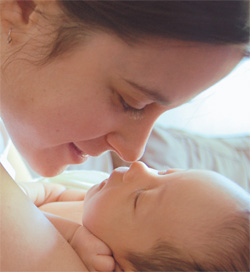Bottle-feeding problems

![]() You may need to wake your baby up to feed her if she sleeps a lot.
You may need to wake your baby up to feed her if she sleeps a lot.
Photo: Marie-Ève Bolduc
Babies can sometimes have trouble feeding. Usually, the problem is temporary. The first thing to do is observe your baby. Try to get a feel for her temperament as well as her feeding and sleeping routine.
Your baby sleeps a lot
If your baby sleeps a lot, you probably wonder whether you should wake her to feed. Knowing what’s best isn’t always easy. You can follow her routine and let her sleep if she
- Wakes up on her own to feed
- Is an active and effective feeder
- Pees at least 6 times and passes at least 3 stools a day
- Is calm and seems satisfied after feeding
- Has regained her birth weight and continues to put on weight
In this case, there is nothing to worry about. Babies each have their own routine that develops over time.
Some babies sleep so much they may skip some feedings, especially during the first 2 to 3 weeks. This means they will have a hard time getting all the milk they need. If your baby sleeps a lot and doesn’t show the signs described above, you need to stimulate her to drink more.
What to do?
- Keep an eye out for signs that she’s sleeping lightly (she’s moving, making sucking motions, or moving her eyes beneath her eyelids) when it will be easier to wake her up.
- Stimulate her: talk to her, massage her back, legs, arms, etc.
- Leave her in an undershirt or diaper: babies drink less when they are warm.
- See a professional if you’re worried or see no improvement after a few days.
Your baby drinks very slowly
Babies can’t always suck effectively at the start. This is more common among babies who were born a few weeks prematurely (between 35 and 37 weeks of pregnancy). Even full-term babies may need a few days or weeks to get the hang of things. This situation usually improves with time. Be patient: your baby is learning. Some babies, however, will continue to drink slowly even as they get older.
What to do?
- Change to a faster nipple.
- Stimulate your baby as she feeds by rubbing her feet and tickling her back and sides.
- Run your finger under her chin and across her cheeks to stimulate her.
- Change her diaper or change her position for a few minutes.
Your baby often chokes while drinking
If the nipple you are using flows too quickly and your baby has too much milk in her mouth, she may choke (i.e., she swallows noisily, coughs and spits up a little milk).
What to do?
- Change to a slower nipple.
- Take short feeding breaks.
- Avoid laying your baby on her back during feeding since milk will flow into her mouth even when she’s not sucking. Try to feed her in a near-sitting position so that the bottle is tilted only slightly downward (just enough for the nipple to fill with milk and not air). Your baby will then be able to drink at her own pace.
Your baby regurgitates a lot
As long as your baby is happy and putting on weight, regurgitation (“spitting up”) is generally nothing to worry about (see Regurgitation).
Some babies drink very fast, and their stomachs expand too quickly. This makes it easier for them to regurgitate, especially if they are very active and start moving around right after feeding.
If milk is coming out of the bottle too quickly, your baby will drink too much just to satisfy her need to suck. If she regurgitates a lot, the nipple on the bottle may be too fast.
What to do?
If your baby is in good spirits and gaining weight, there’s nothing to worry about. You don’t need to do anything.
If regurgitation seems to be bothering her, watch her drink. If necessary, try these strategies:
- Change to a slower nipple.
- Take short feeding breaks.
- Try to burp her more.
- Avoid laying your baby on her back during feeding. Try to feed her in a near–sitting position so that milk will flow into her mouth more slowly.
- Try to keep activity to a minimum right after feeding.
It’s best to see a doctor if your baby
- Seems to be in pain
- Projectile vomits several times a day
- Wets fewer diapers
- Isn’t putting on enough weight
Your baby refuses the bottle
Your baby normally breastfeeds, and you want to bottle‑feed her? If she has trouble bottle-feeding or refuses to altogether, see Bottle-feeding your breastfed baby.


